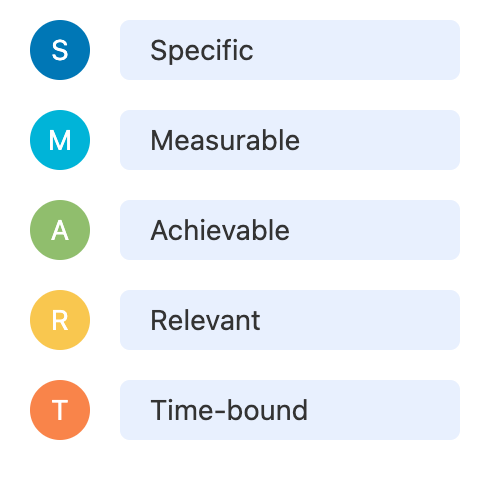Guiding your team’s growth means helping them turn aspirations into actionable steps. In this unit, you’ll learn how to prompt meaningful self-reflection, break down big goals into manageable actions, and use the SMART framework to set your team up for real progress. These skills will help you empower your team to take ownership of their development and move forward with clarity.
The first step in any development plan is self-reflection. Encourage your team members to think deeply about their strengths, interests, and long-term ambitions. You can do this by asking open-ended questions such as "What part of your work do you find most energizing?" or "If you could take on any project, what would it be?" These prompts help your team clarify what truly motivates them and where they want to grow. Listening actively and following up with curiosity shows that you’re invested in their journey.
Once aspirations are clear, help your team translate them into concrete, achievable steps. If someone says, "I want to become a strategic finance lead," guide them to identify the skills and experiences required for that role. For example, you might respond with, "Let’s list out the key skills for that position—like financial modeling, stakeholder management, and presenting to leadership. Which one do you want to focus on first?" This approach makes big ambitions feel less overwhelming.
To make these steps even more effective, use the SMART framework: Specific, Measurable, Achievable, Relevant, and Time-bound. Instead of a vague goal like "Get better at financial modeling," help your team member reframe it as "Complete an advanced financial modeling course and build a model for our next business case by the end of Q3." This clarity makes it easier to track progress and celebrate wins along the way.

Here’s a realistic example of how a manager can guide a team member through self-reflection and goal-setting using the SMART structure:
- Jessica: Thanks for meeting with me, Ryan. I wanted to talk about your career goals and see how we can make them more actionable.
- Ryan: I appreciate that, Jessica. I know I want to move into a strategic finance lead role, but I’m not sure where to start.
- Jessica: That’s a great goal. Let’s break it down—what skills do you think are most important for that position?
- Ryan: Probably financial modeling, presenting to leadership, and managing cross-functional projects.
- Jessica: Excellent. Which of those would you like to focus on first?
- Ryan: I think financial modeling. I want to feel more confident there.
- Jessica: How about we set a goal like
"Complete an advanced financial modeling course and build a model for our next business case by the end of Q3"? That way, it’s specific and we can track your progress together.
